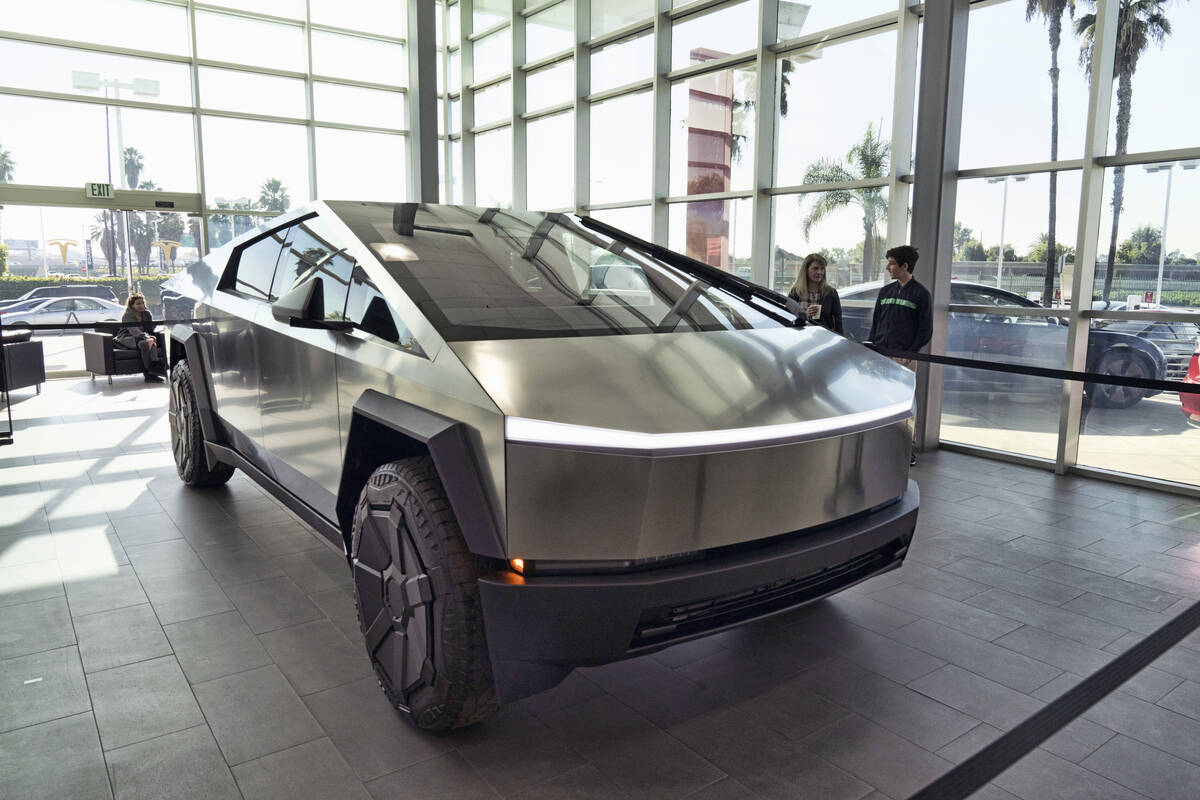Tesla's Cybertruck Recall: Unraveling the Accelerator Pedal Defect Affecting All Units
The Cybertruck recall serves as a reminder that even the most innovative and forward-thinking companies are not immune to the challenges and risks associated with mass production.

In a stunning turn of events, Tesla, the pioneering electric vehicle manufacturer, has initiated a comprehensive recall of all its highly anticipated Cybertruck models. The recall, which encompasses a staggering 3,878 units, affects every Cybertruck delivered to customers since the vehicle's launch in late 2023. This unprecedented move comes in response to a critical issue with the accelerator pedal, posing a significant safety risk to drivers and passengers alike.
The Accelerator Pedal Defect: A Closer Look
At the heart of this recall lies a seemingly innocuous component: the accelerator pedal. The defect, as identified by Tesla and the National Highway Traffic Safety Administration (NHTSA), involves a pad that can detach from the pedal and become lodged in the vehicle's interior trim. This malfunction can lead to unintended acceleration, a hazardous scenario that drastically increases the risk of collisions and accidents.
The root cause of this issue has been traced back to an unauthorized lubricant used during the assembly process. The lubricant in question, identified as soap, compromised the integrity of the pad's attachment to the pedal, rendering it susceptible to dislodging under certain conditions. This oversight in the manufacturing process has now culminated in a far-reaching recall that has sent shockwaves through the automotive industry.

The Scope of the Recall: Every Cybertruck Affected
One of the most striking aspects of this recall is its comprehensive nature. Unlike many recalls that target specific production batches or manufacturing periods, Tesla's Cybertruck recall encompasses every single unit that has been manufactured and delivered to customers between November 13, 2023, and April 4, 2024. This all-encompassing approach underscores the severity of the issue and Tesla's commitment to addressing it promptly and thoroughly.
The recall affects a total of 3,878 Cybertrucks, a figure that represents the entirety of the model's production and delivery to date. This staggering number highlights the scale of the problem and the logistical challenges that Tesla now faces in rectifying the situation. The company must now mobilize its resources to contact every Cybertruck owner, schedule repair appointments, and ensure that the necessary fixes are implemented swiftly and efficiently.
The NHTSA's Urgent Call to Action
The National Highway Traffic Safety Administration (NHTSA) has played a crucial role in bringing this issue to the forefront and urging immediate action. The agency, responsible for overseeing automotive safety standards and regulations, has emphasized the grave risk posed by the accelerator pedal defect. In its official communication, the NHTSA has highlighted the increased likelihood of collisions and accidents resulting from unintended acceleration.
The NHTSA's stance on this matter has been unequivocal: all Cybertruck owners must contact Tesla without delay to schedule repair appointments. The agency's sense of urgency underscores the critical nature of the issue and the paramount importance of addressing it promptly. By leveraging its authority and reach, the NHTSA has amplified the recall's visibility and ensured that the message reaches every affected Cybertruck owner.

Tesla's Response: Swift Action and Comprehensive Repairs
Faced with this significant challenge, Tesla has demonstrated a proactive and decisive approach in addressing the accelerator pedal defect. The company has swiftly initiated a multi-pronged response to mitigate the risks and ensure the safety of its customers.
Firstly, Tesla has halted all Cybertruck deliveries until the issue is resolved. This precautionary measure ensures that no additional vehicles with the faulty accelerator pedal assembly reach customers' hands. By suspending deliveries, Tesla has effectively contained the problem and prevented further exposure to the potential hazards associated with the defect.
Secondly, Tesla has committed to replacing or reworking the accelerator pedal assembly in all affected Cybertrucks at no cost to the owners. This comprehensive repair strategy aims to rectify the issue at its core, eliminating the risk of unintended acceleration. By offering these repairs free of charge, Tesla is demonstrating its commitment to customer safety and satisfaction, even in the face of a significant manufacturing oversight.
Moreover, Tesla has extended its recall efforts to Cybertrucks that are currently at delivery centers or in transit to customers. These vehicles will undergo the necessary fixes before being released to their intended recipients. This proactive approach ensures that no Cybertruck reaches a customer without the appropriate modifications, further emphasizing Tesla's dedication to resolving the issue comprehensively.

The Role of Social Media in Uncovering the Defect
One of the most intriguing aspects of this recall is the pivotal role played by social media in bringing the accelerator pedal defect to light. The issue gained significant traction when a Cybertruck owner posted a viral TikTok video showcasing the dislodged pedal cover. This user-generated content quickly spread across various platforms, garnering widespread attention and sparking a public discourse about the potential safety implications.
The impact of this single TikTok video cannot be overstated. It served as a catalyst for further investigation, prompting other Cybertruck owners to come forward with similar experiences. The video's virality also caught the attention of automotive experts, consumer advocacy groups, and eventually, the NHTSA itself. This groundswell of consumer feedback and digital engagement played a crucial role in expediting the recall process and ensuring that the issue received the attention it deserved.
The Cybertruck recall serves as a powerful testament to the influence of social media in the automotive industry. It highlights the importance of consumer voices and the ability of digital platforms to amplify concerns and drive change. As we move forward in an increasingly connected world, the role of social media in identifying and addressing automotive safety issues is likely to become even more prominent.

The Implications for Tesla and the Electric Vehicle Industry
The Cybertruck recall represents a significant setback for Tesla, a company that has built its reputation on innovation, performance, and customer satisfaction. The recall not only poses logistical challenges but also raises questions about Tesla's quality control processes and its ability to scale production while maintaining the highest standards of safety and reliability.
However, it is essential to view this recall in the broader context of the electric vehicle industry. As the demand for electric vehicles continues to surge, manufacturers are under immense pressure to bring new models to market quickly while navigating the complexities of emerging technologies. The Cybertruck recall serves as a reminder that even the most innovative and forward-thinking companies are not immune to the challenges and risks associated with mass production.
Despite this setback, Tesla's proactive response and commitment to addressing the issue head-on demonstrate a level of accountability and customer-centricity that sets a positive example for the industry as a whole. By prioritizing safety and taking swift action to rectify the problem, Tesla is reaffirming its dedication to building trust and confidence among its customer base.
Moving forward, the Cybertruck recall is likely to have far-reaching implications for Tesla and the electric vehicle industry. It may prompt a reevaluation of manufacturing processes, quality control measures, and supply chain management. It may also spur increased collaboration between manufacturers, regulatory bodies, and consumer advocacy groups to ensure that safety remains at the forefront of innovation.

Conclusion: Severe Issue Addressed With Urgency
The Tesla Cybertruck recall, affecting all 3,878 units delivered to customers, represents a significant challenge for the electric vehicle giant. The accelerator pedal defect, caused by the use of an unauthorized lubricant during assembly, poses a serious safety risk and necessitates immediate action from both Tesla and Cybertruck owners.
The recall's comprehensive scope, encompassing every Cybertruck manufactured and delivered between November 13, 2023, and April 4, 2024, underscores the severity of the issue and the urgency with which it must be addressed. Tesla's swift response, including halting deliveries, offering free repairs, and extending fixes to vehicles in transit, demonstrates the company's commitment to customer safety and satisfaction.
The role of social media in uncovering and amplifying the accelerator pedal defect highlights the growing influence of consumer voices and digital platforms in the automotive industry. As we move forward, the lessons learned from this recall will likely shape the future of electric vehicle manufacturing, emphasizing the importance of robust quality control, transparent communication, and a customer-centric approach.
While the Cybertruck recall presents significant challenges for Tesla, it also offers an opportunity for growth, learning, and improvement. By addressing this issue head-on and prioritizing the safety and well-being of its customers, Tesla can emerge from this setback stronger, more resilient, and better equipped to lead the charge in the electric vehicle revolution.




